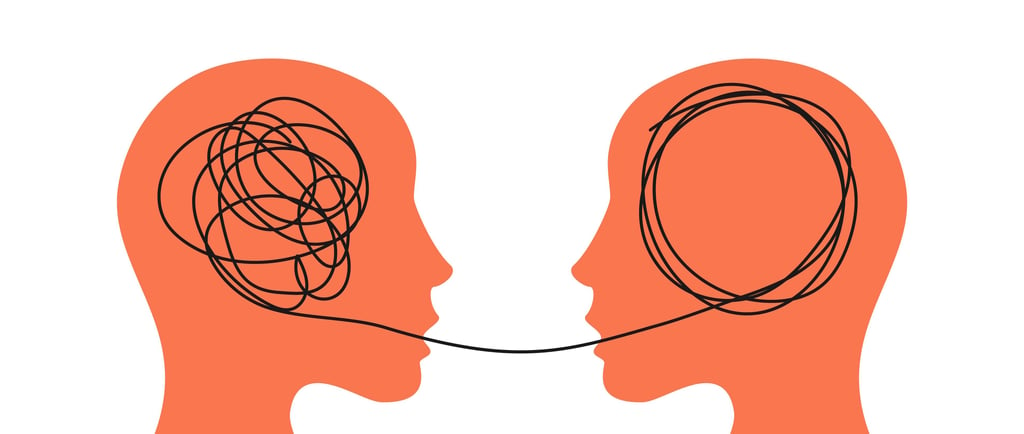Two Managers, Two Outcomes: Why Workplace Mental Health Needs a Human Touch
Since this year’s World Mental Health Day is focused on mental health at work, I want to share two stories that show just how different the workplace can be when it comes to supporting mental health.
Pete White
10/10/20244 min read


Since this year’s World Mental Health Day is focused on mental health at work, I want to share two stories that show just how different the workplace can be when it comes to supporting mental health.
Story 1
Back in 2015, I was in a rough spot. Depression had its claws in me, and my PTSD was never far from the surface. I was seeing military mental health professionals, popping anti-depressants, and occasionally taking a day or two off when I couldn’t face the world.
My line manager, a Sergeant we’ll call Steve, thought weekly welfare check-ins would help. At first, they were okay—"How are you?" and "What can we do to help?"—but over time, the tone shifted to "What’s wrong with you?" and "We all go through tough times; you just need to man up."
Then came the day I was called into his office. There he was, sitting with my Flight Sergeant. On the table in front of us were all my medical notes—every sick chit from the past four years: tonsillitis, my busted knee, and, of course, my mental health days. The conversation went like this:
"SAC White, this mental health stuff has been going on for a while now, and frankly, we’re fed up. The lads in the section feel the same. It seems like your time off just happens to line up with when there’s work to do. So, we reckon you're using this as an excuse to avoid work. We're ordering you to knock it off, or we’ll have to charge you."
They meant a military charge.
There’s more to the story, but that conversation? It pushed me frighteningly close to ending my life. It shattered my trust—not just in military leadership, but in people in general. It was a few more years before I left the military, but that moment definitely sped things up.
Steve also took it upon himself to monitor my social media. If I posted about going out for dinner with my wife or having a fun day out, I’d get dragged in for a grilling—"If you can do that, why can’t you work?"
Story 2
A year later, I was posted somewhere else, and mentally, I was in an even worse state. But this time, I had a manager we’ll call Amy. Like Steve, she was a Sergeant, but her approach was night and day compared to his.
Amy had regular chats with me, but they weren’t forced. They were relaxed. She spent more time getting to know me—asking about my wife, my family, my hobbies. She’d tell me about her life too, like what her dog was up to or what was on her mind. We’d have a laugh.
At no point did I feel like I was the problem she was trying to solve. She genuinely gave a shit about me as a person. Because of that, I ended up taking less time off. I didn’t feel like I had to hide my struggles. It was okay to have a bad day.
I eventually left the military during this time, but it was due to a medical discharge—more of a natural progression. I still speak with Amy to this day and would work with her in a heartbeat.
Two Approaches, Two Outcomes
Now, the difference between these two approaches might seem obvious, but let’s dig a bit deeper.
I don’t think Steve was trying to be a dick or cause me harm. I believe he just didn’t understand mental health. He saw it as a problem to be fixed, so he gave something a go. He got it very wrong—about as subtle as a grenade going off—but I don’t think it was out of malice.
Amy, on the other hand, understood mental health. She didn’t treat me like a problem to solve; she treated me like a person. By taking the time to just chat with me, as one human to another, she created an environment where I felt safe to be myself. I didn’t have to hide my bad days, and I wasn’t worried about being interrogated if I went out for a bloody meal with my wife.
These stories highlight what’s needed in the workplace. Managers need to understand mental health, feel comfortable discussing it, and know the right way to approach an employee struggling with it. It’s not about treating people like problems to be fixed. It’s about treating them like people, full stop.
Unfortunately, many workplaces are falling short of this. A mental health first aid course can help, sure, but what we really need is a cultural shift. When managers feel supported, they’ll be better at supporting their teams. Employees aren’t just assets—they’re individuals. And if they’ve got something going on, even if it’s not work-related, it’s not only a legal responsibility to support them—it also makes financial sense. Happier, healthier employees work better.
Let me leave you with this: World Mental Health Day (and all the others like it) are nice, but mental health shouldn’t be something we focus on for one day. It should be part of everyday life.
That doesn’t mean talking about suicide, depression, or anxiety all the time. It means talking—about our likes, our dislikes, our families, our hobbies, the stupid little things that make us laugh.
It means acknowledging when someone’s having a bad day and not brushing it off. And it means giving people the tools and knowledge to understand mental health so they can spot when something’s off and know how to handle it when those harder conversations come up—because they will.
© 2025. All rights reserved.
